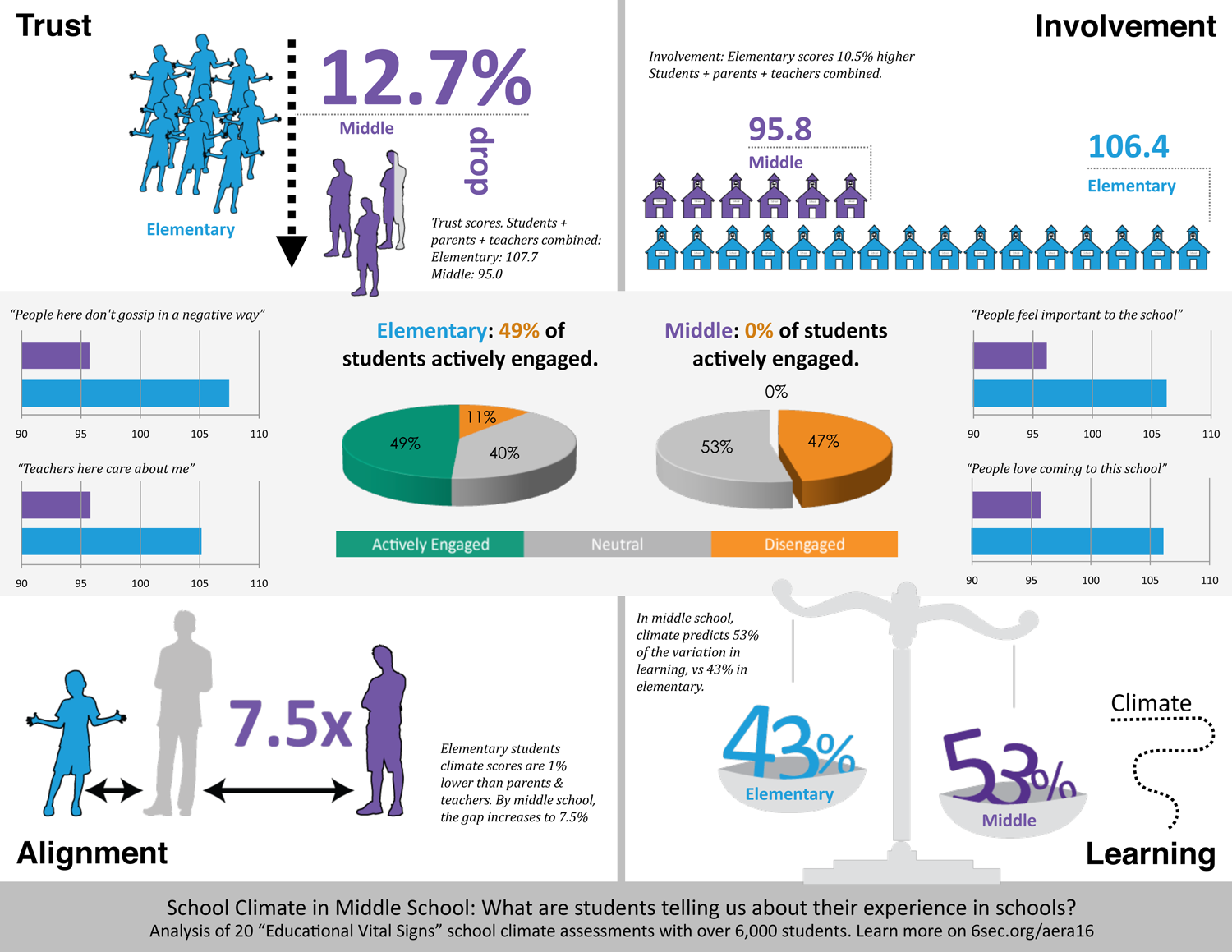Home > Emotional Intelligence in Education > Case Studies > Middle School Disengagement
Research: Epidemic of Adolescent Disengagement
Study across 20 middle schools, insights from the Educational Vital Signs (EVS) shows need for SEL interventions to focus on student voice; research paper at AERA.
Overview
Situation: While there is a growing awareness of the importance of social emotional learning (SEL) in middle school (student ages approximately 11-13 years), this age span frequently faces significant social emotional challenges.
Solution: Analysis of over 6000 student responses from 20+ school climate assessments (using Education Vital Signs – EVS) to measure school climate — and qualitative analysis to detect themes of student perceptions on needs for SEL.
Results: EVS revealed 0% engagement in middle school students and that students craved authentic connection with their teachers and mentors
“We were impressed with the profound need that students expressed for teachers who are mentors, attuned to their needs, helping them cope with stress, and modeling compassion; teachers who could help them become change-makers.”
~ Researchers
Situation
Middle school students (ages approximately 11-13 years), often report that the social and emotional dynamics are not conducive to wellbeing and achievement. How do students actually view middle school versus elementary school? What are their perceived social emotional needs? This study was based on the premise that it is necessary to understand middle school students’ experience in schools in order to effectively design and implement SEL programs that will address the specific needs of early adolescents.
Solution
Using the Six Seconds’ Educational Vital Signs (EVS) school climate survey, researchers analyzed previously collected data from over 20 schools globally, and from more than 6000 participants. The issue of school climate has garnered a good deal of attention and the session was well-attended by educational researchers seeking to understand the factors that drive student success in these challenging years.
Results
Key Factors for Young Adolescents’ School Success. The research reveals important themes pertinent to everyone working with middle schoolers:
STRESS
Middle school students are stressed about academics and social interactions
ADULT MENTORS
They see the importance of their teachers as mentors and supporters
FEELING CARE
Then need to feel more cared for by “real friends” and adults
SIGNIFICANCE
They want to feel that they are important to the school
CLIMATE FOR LEARNING
School climate predicts 53% of the variation in learning in middle school.
NO ENGAGEMENT
Where 49% of elementary students are actively engaged, no middle school students in the study are in the “engaged” category.
TRUST DROPS
Compared to elementary school, there is a 12.7% decline in trust in middle school
%
%
%
Tools & Methods In This Case
School Climate Assessment
EVS – Education Vital Signs provides a snapshot of the current school or classroom climate. EVS quickly identifies areas both supporting and interfering with school success – in a simple, powerful framework ideal for putting the data into action.
Research Analysis
As an organization working to identify and disseminate the most effective methods to increase emotional intelligence, Six Seconds’ team includes researchers using quantitative and qualitative tools to translate data into action.
Learn More About This Case
See More Cases
Accelerating Leadership Development with Emotional Intelligence
Excelitas Technologies doubles the number of high-performing leaders across global regions.
Doubling Engagement to Increase Plant Performance
In the midst of an economic crisis, Komatsu create readiness for change while increasing engagement and performance.
Transforming Climate for Sales at UCB
Equip managers with EQ skills to change a team’s climate, and ultimately, the client experience.
Creating a Culture of Safety at Specialty Chemical Plant
A multi-year intervention in an American chemical manufacturing plant led to a 91% improvement in employee engagement, which was correlated with a 167% increase in production quality and an 83% decrease in reportable safety incidents.
Improving Management, Engagement & Performance at Amadori
This three-year case study at Amadori shows the link between EQ, managerial effectiveness, and plant performance.
Empowering Women Leaders with Emotional Intelligence
Does emotional intelligence matter for women leaders? New case study shows why and how.







